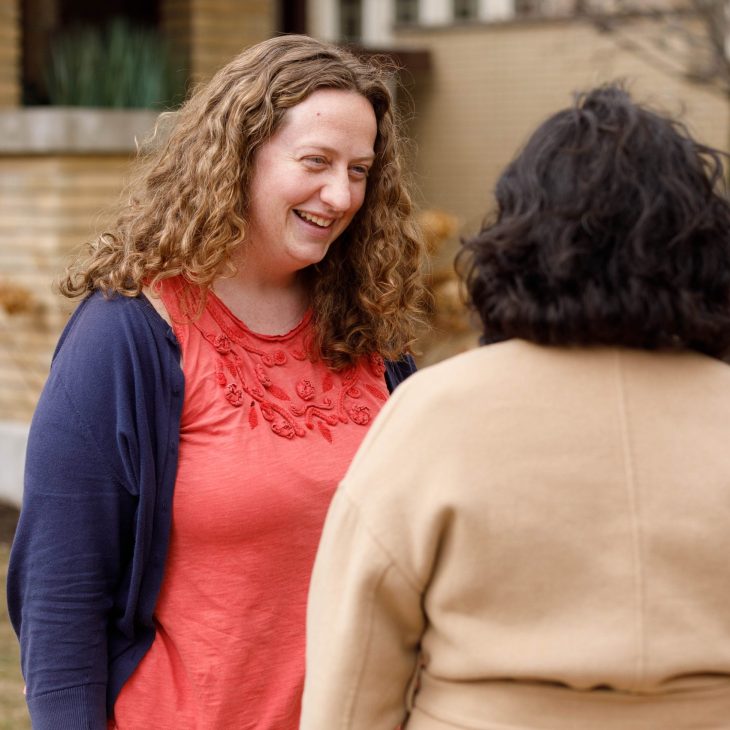Imagining Chaplaincy Support in the Courthouse
March 23, 2023

When you’re a pastor, you end up at the courthouse sometimes.
A congregant has a family member who has been harmed and needs spiritual support during the trial. Another has been accused and wants to pray before the verdict. A young member of the community has been killed by the state, and you join the protest outside its doors.
But last week, jury duty brought me to our local courthouse, there for the first time ever in my personal, rather than professional, capacity. Or so I thought.
It turns out, as I should know by now from long experience, that you can take the collar off but you never really turn off the minister. I walked into the room where potential jurors are held until courtrooms are ready and clocked an administrator tracking paperwork for a few hundred of us who seemed stressed beyond belief. A juror was in the corner having a hushed and urgent conversation on their cell phone, clearly upset.
A few hours later, when my assigned group of forty potential jurors was called to a courtroom for the selection process, we saw the family of the defendant walk out the door as we walked in. All I wanted to do was ask if they needed anything but knew that would only complicate things for everyone should I be selected.
In the room, one lawyer was absent, and I wondered idly if it was illness, burnout, or “other.” The judge was kind and measured as he tried to maintain fairness within the dictates of an often unfair system, the clerk was nervous on her first day. During our bathroom break, someone who had just been sentenced came running through the hall headed for stairs and freedom, chased by bailiffs and a crying partner and child. Once she was captured, they remained, world upended, with no one but a hallway of strangers to ease the pain.
There are so many places in every community – hospitals, prisons, courthouses, many workplaces, and schools – where deep pain is a daily reality. And as more and more people are less and less connected to organized forms of enduring community (faith communities, book clubs, political parties, heck, I’d take a bowling league), I’m not sure what all the people in these places are doing for support.
My church members called me when they needed someone at the courthouse, but lots of people for their own good reasons don’t have an obvious person to ask. Well-resourced hospitals have chaplains to try and secure the kind of emotional and spiritual support each patient desires, but most medical facilities don’t. Many public entities, with understandable fears of privileging a religion inappropriately, don’t even try the chaplain route but instead expect people to process what they endure in those places later, in their private time.
Every answer is fraught. No solution is perfect. But I only become more convinced each day that there is a need. Whether it’s Spiritual Directors, Movement Chaplains, wandering mendicant therapists, neighborhood resource groups, strengthening peer support abilities, a combination or some as yet undiscovered source of accessible spiritual succor for the masses, we need more ways for anyone to access spiritual and emotional support in hard times that they don’t need to pay for, and that doesn’t require a pre-existing organizational affiliation.
Maybe I’ll sit on a bench outside the courthouse next week with my collar and see if anyone walks up. Maybe you have a silly idea you’ve been too embarrassed to follow through on. Let’s all give it a try, compare notes, and see if we can’t figure it out.
Details were anonymized to protect the identities of the people involved.
Rev. Hannah Kardon is a spiritual companion, pastor, parent, and author in the greatest city in the world, Chicago. She has previously served Urban Village Church, Elston Avenue United Methodist Church, and Interfaith America and helped create innovative church experiences like Tattoo Testimonies and the Drag & Spirituality Summit. She is a certified Spiritual Director trained by Still Harbor, and an ordained elder in the United Methodist Church. She is co-author of “Finding Peace in an Anxious World” and author of “Healing & Joy on Your Journey to God”.
Share
Related Articles
American Civic Life
Are Chaplains Religious Leaders? Most Americans Say Yes in New Survey
American Civic Life
Mormon Support for Same-Sex Marriage Has Doubled in the Last Decade, Survey Shows
American Civic Life
Apply Now
Emerging Leaders
Sacred Journey Fellowship
The Sacred Journey Fellowship offers coaching, a cohort experience, and workshops to interfaith leaders who seek to bridge deep divisions.
Learn More


